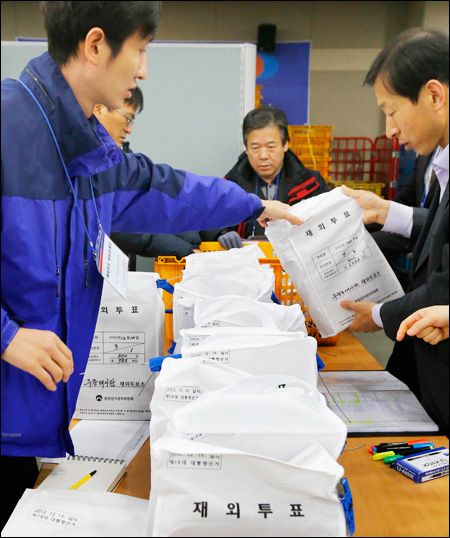
The high turnout rate in overseas absentee voting, which was wrapped up on Tuesday, stirred speculation about which candidate was likely going to benefit from it.
According to the National Election Commission (NEC), more than seven out of every 10 registered overseas voters cast their ballots in polling stations in their nearest Korean consulates or embassies.
The election watchdog said some 220,000 Koreans from 110 countries registered as voters for the Dec. 19 election and 71.2 percent of them turned out to vote in polling stations.
Conventional election wisdom said overseas voters are conservative and therefore they tend to vote in favor of the right-wing Saenuri Party.
But the voter population of these Koreans indicated that no one can rule out the possibility that a different outcome may come once all votes are counted.
The NEC said 80.6 percent of some 220,000 registered overseas voters are Korean citizens abroad for a short-term stay, such as students or workers dispatched to overseas branches of public or private firms. These people are in their 20s, 30s and 40s.
Those with permanent residence of their host countries, account only for 19.4 percent.
Public opinion surveys found that the majority of voters in their 20s and 30s are in favor of Moon Jae-in of the main opposition Democratic United Party (DUP).
A recent Gallup poll showed that support rates for Moon among 20- and 30-somethings were 61 percent and 51 percent, respectively, compared with his rival Park Geun-hye’s 24 percent and 32 percent, respectively.
Survey results of voters in their 40s vary, depending on polls. The Gallup poll showed Moon is ahead of Park with some 7 percentage points. But a recent JoongAng Ilbo newspaper poll said the opposite. Park is ahead of Moon with a similar margin among 40-something voters.
The high turnout among overseas voters also gave a clue to which candidate would gain. Voters in the United States said usually they have to drive four or five hours to get to the nearest polling station to vote. In total, they have to invest nearly 10 hours to cast their ballots.
They complained the long distance to polling stations made it difficult for them to exercise their right to pick a new president.
Despite the setback, voter registration and the turnout rate in the presidential election were more than double, compared with those of the National Assembly election held in April.
Kim Mee-young, an eligible voter living in Tallahassee, Florida, told The Korea Times that she didn’t participate in the overseas absentee voting because it was hard for her to drive such long hours to the nearest polling station in Atlanta solely for voting.
“I know one of my neighbors registered and drove all the way to Atlanta for voting, despite his busy schedule. I admire voters like him because voting was simply too inconvenient for many of us,” she said. “Despite the difficulties, those who participated in voting are people who were determined to do so as they were eager to make their voice heard through the voting.” <The Korea Times/Kang Hyun-kyung>




